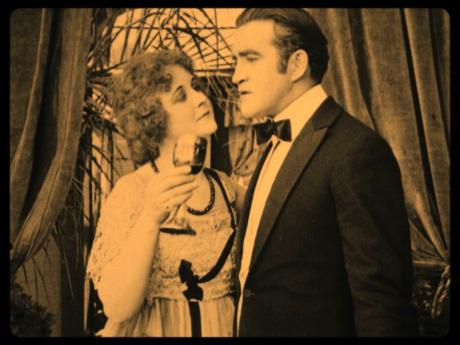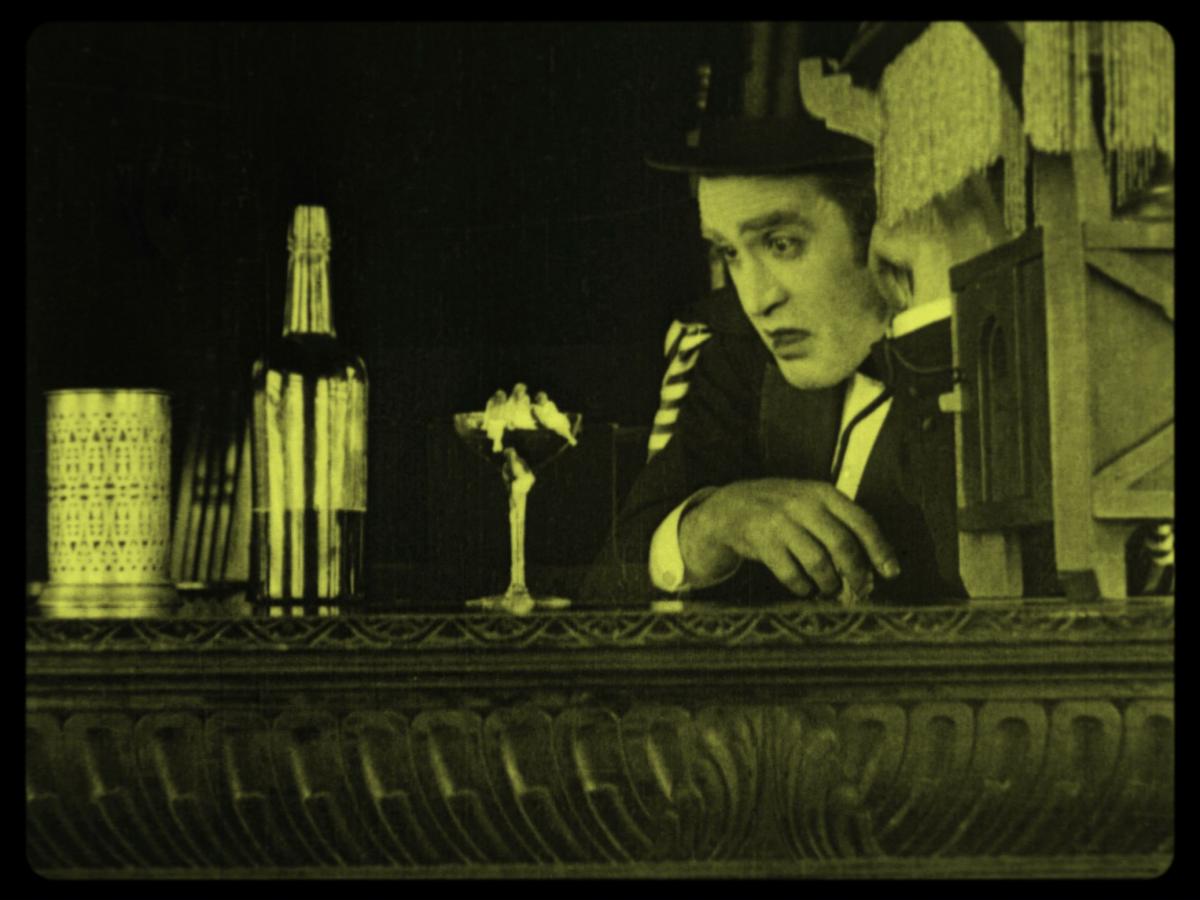
Francis Ford/Universal, 1918 (Universal release: 1919). Director: Francis Ford. Scenario: Francis Ford. Camera: Edward Gheller. Cast: Francis Ford, Mae Gaston, Peter Gerald, Duke Worne, Jean Hathaway.
Frame enlargements courtesy Undercrank Productions/EYE Filmmuseum.
Like most film enthusiasts, I’m a great admirer of John Ford—an admiration that soon leads to discovery of John’s older brother and mentor Francis Ford. Most of us have seen Francis’ cameo appearances in John’s later sound films, often casting him as a comic drunk. But the viewer who knows Francis only from these bumbling comic turns has a pleasant surprise in store. The fact is that Francis Ford had a distinguished film career in his own right, a career that both preceded and launched his brother’s. And though his films have languished in the shadow for generations, they’re fully worthy of rediscovery and appreciation.
The problem has always been that so few of Francis Ford’s films have survived for latter-day viewing. A few have been available—the great 1912 Western The Invaders, reviewed in an earlier edition of this column, is a notable example—but, by and large, his earlier career has been hidden from sight. Now, a fascinating new Blu-Ray from our friends at Undercrank Productions does much to fill in the gaps. Produced in concert with Ford scholar Kathryn Fuller-Seeley, this disc offers a varied sampling of Ford’s talents as an actor and filmmaker in the 1910s. And the centerpiece of the collection is the long-lost feature The Craving.
The Craving, in addition to its qualities as a film, has an equally compelling backstory. In 1918 Ford already had an impressive track record in the movies, having acted in and/or directed scores of films for several studios, in particular Universal. On the strength of that record, Ford made a bold career move: he founded his own studio. The range of his ambition is evident in one of his first productions, The Craving, a film produced, directed, written by, and starring Francis Ford. As a result of his total control, this five-reel feature is the clearest glimpse we’re ever likely to get of Ford as an auteur.
And, as such, it’s a surprise. Here the erstwhile director/star of Westerns, serials, and other action films offers a film based solely on his own vision—and delivers a modest, introspective drama with only six characters. (In the late 1910s, of course, such films were not uncommon.) The basic premise is melodramatic enough: Ford is a scientist working on a formula for a deadly explosive, a formula sought by a foreign operative for nefarious purposes. But Ford the scenarist grounds his story with an element of humanity: the scientist is a recovering alcoholic, and the villain, discovering his weakness, proceeds to exploit it in order to overcome his resistance. In the end, it’s this struggle against alcoholism, not the bare plot mechanics, that dominates the story (hence the film’s title). Seen in hindsight, considering all the stumbling drunks that Ford was obliged to play for laughs in later years, this thoughtful, understanding treatment of an all-too-human ailment is striking.
On a technical level, too, The Craving fascinates. As Ford the reformed alcoholic relates his story in flashback, we see him confronted by his hallucinations in the form of little sprites, tiny dancing girls that cavort in his bottle and his glass and stow away in his coat pocket. This effect, achieved through multiple exposures, is pulled off seamlessly. In a later scene Ford confronts himself in an effort to regain control of his mind, an effect that again makes use of double and triple exposures. Apart from these scenes, perhaps in an effort to compensate for a limited budget, Ford “opens up” the story in interesting ways. The heroine’s flashback makes use of large-scale battle scenes taken from Ford’s 1915 Universal feature The Campbells Are Coming, a film that is itself considered lost. Elsewhere, stock footage of the battlefields of World War I is similarly interpolated into the story.
The heroine’s flashback makes use of large-scale battle scenes taken from Ford’s 1915 Universal feature The Campbells Are Coming, a film that is itself considered lost. Elsewhere, stock footage of the battlefields of World War I is similarly interpolated into the story.
Having completed his film in late 1918, Ford tried to distribute The Craving on the states’ rights market—and failed. Ultimately he sold the rights to his old employer, Universal, who released the film early in 1919. Evidence suggests that some scenes, likely the scenes involving the war, were altered between Ford’s original cut and the Universal release. Many filmmakers were compelled to rework their war-related content after the signing of the Armistice in November 1918. A reported alternate storyline in The Craving—in which the Ford character braces up, enlists in the service, and then returns at the end of his hitch to settle accounts with the villain—may have been a casualty of these events. (This would account for a certain awkwardness in the introduction of the battlefield scenes in the version we see today.) Ford’s film career would continue for decades afterward, of course, but the failure of his independent production venture in 1918 must have been a great disappointment. We’re doubly fortunate to be able to see this film resurrected today.
Like so many other “lost” American silents, The Craving was discovered in the collection of the EYE Filmmuseum in Amsterdam, in the form of a tinted 35mm print with Dutch titles. For this disc the EYE technicians and the Undercrank team have worked together to restore the picture digitally, preserve the original tints, and reconstruct the English titles. As if all this were not enough, the disc also includes three short rarities from Ford’s earlier career: two of his many Westerns (including one produced in Texas by Gaston Méliès) and a tantalizing glimpse of his work with longtime creative partner Grace Cunard. And all these films benefit from strong, evocative piano accompaniment by Ben Model. Thanks to this embarrassment of riches, we’re a little closer to a full appreciation of an important, and too nearly forgotten, pioneer of American film.

